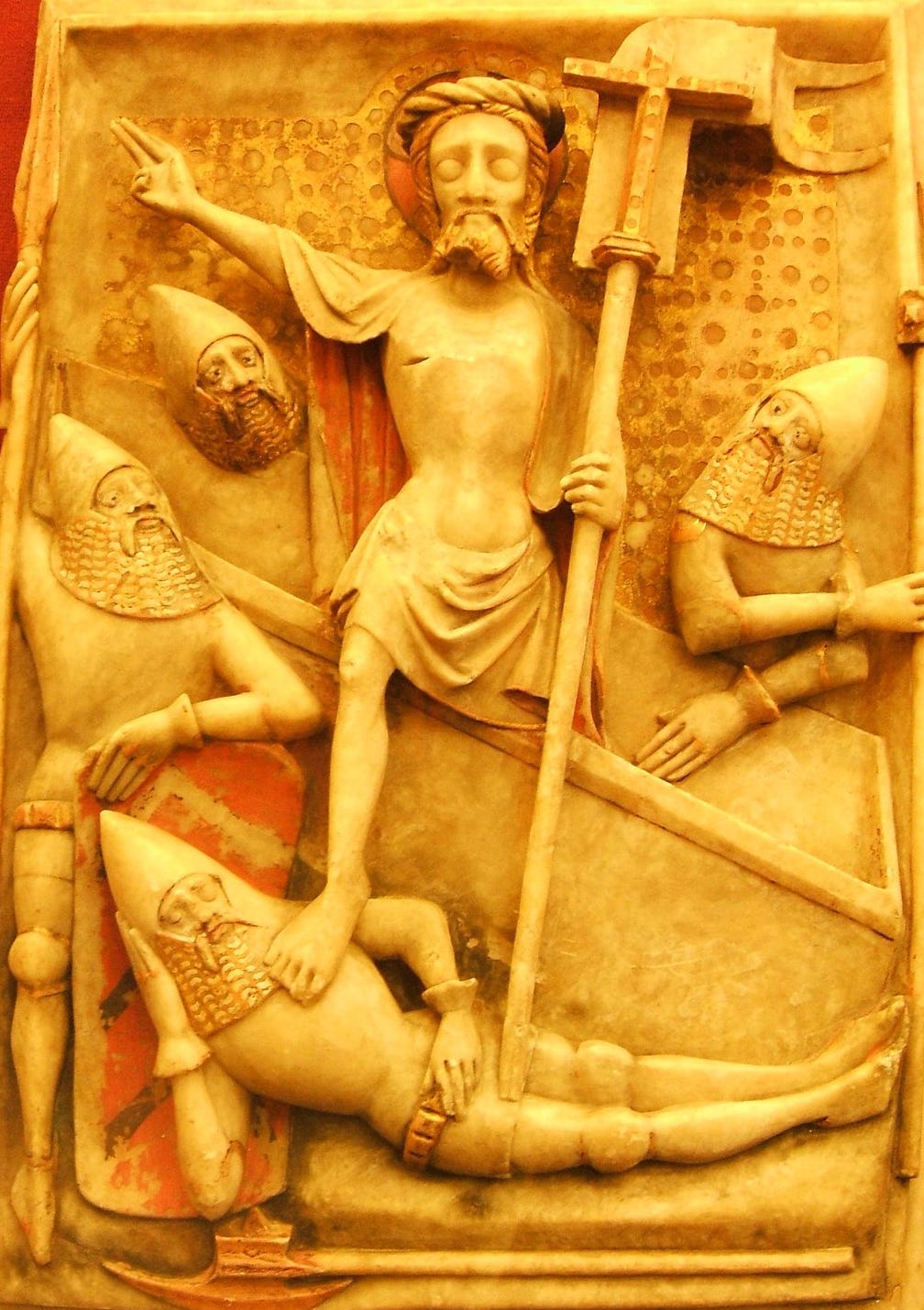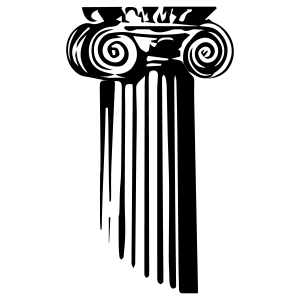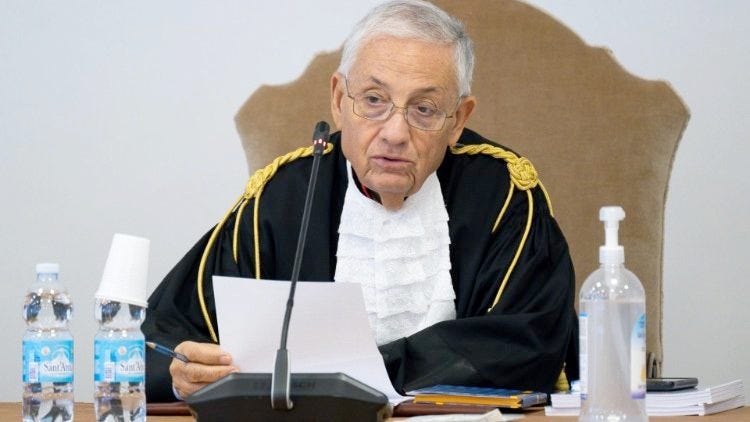Hey everybody,
Today is Tuesday of the Octave of Easter, and you’re reading The Tuesday Pillar Post.
Happy Easter. Really, I mean that. I hope you’re having a blessed Easter Octave, and that you’re celebrating the Resurrection of Jesus Christ with real and actual feasting and merry-making.
If you observed Lent for 40 days, it would be a shame to reduce Easter, for which you spent all that time preparing, to just one day.
Easter, after all, is the eternal feast we hope to enjoy. So if you haven’t let the Easter party extend past Sunday, consider it — there’s a lot of time left.
Here at The Pillar, we mostly took the sacred Triduum and Easter Monday off from work to observe the Holy Days, so our news coverage is a bit light in this morning’s newsletter.
But since I suspect that many of you have taken the past few days off from reading the news, I put together a little bit of a round-up on some things you might have missed.
Easter roundup
Orthodoxy, and Easter, in Ukraine
First, it is not yet Easter for most Christians living in Ukraine, where the Battle of Donbas is raging in the east, and in the west, the city of Lviv saw its first missile-strike casualties on Monday.
Ukraine has defended Kyiv and the fighting has shifted, but the war is far from over.
Amid the humanitarian and social crisis that will envelop Ukraine from years to come, there has also occasioned a serious ecclesiastical crisis for the 70% of Ukrainians who are Orthodox Christians.
Orthodoxy in Ukraine has two hierarchies, and two sets of dioceses and parishes: one subject to the jurisdiction of Moscow, and one recognized by most Orthodox patriarchs as independent, or autocephalous. But the parishes and dioceses of the Ukrainian Orthodox Church of Moscow Patriarchate are beginning to separate themselves from Moscow’s Patriarch Kirill — in fact more than 400 of its priests say that Kirill should be tried for heresy.
The fracturing of Orthodox jurisdictions in Ukraine leaves a lot of things in flux, and it is not clear what jurisdictions, hierarchies, and Orthodox institutions will be left in place when the fog of war begins to clear, especially because any effort to unify the strains of Orthodoxy in Ukraine will have to figure out what to do with an excess of diocesan bishops, few of whom will be keen to simply merge their sees with someone else’s.
The Pillar’s Anatolii Babynskyi talked this week with Orthodox clerics and theologians on all sides of the crisis — and if you want to understand the situation, there is no one more important to read than Anatolii, who is talking with the decision-makers on the ground, and those impacted by their decisions.
Babynskyi’s report also offers some insight into the ecclesiology of Orthodoxy, and some underlying theological differences:
“We see civilians being killed, children and women being killed, and in Moscow the patriarch blesses all this with the icon of the Mother of God, but our bishops are not reacting to this,” Abbot Job Olshanskyi said.
The abbot said his vision of Orthodoxy was formed outside Ukraine, when he was a monk on the holy Mount Athos in Greece. It was deprived of the ideological influence he said occurs in the Russian Church.
“After the transition, it turned out that the people I had been with for many years looked at some ecclesiological issues differently than I did. For them, the Church is a structure - you belong to this denomination, and you must remain faithful to it. But for me, fidelity to the Church is fidelity to Christ and its fundamental dogmatic principles,” Olshanskyi told The Pillar.
Most Ukrainians - Orthodox and Catholic - will celebrate Easter on this upcoming Sunday, April 24, as will Orthodox Christians around the world, along with some Eastern Catholics.
If you’re wondering why there are two dates for Easter, The Pillar published a great explainer in 2021, which you should check out. You can find it right here.
The history of two Easters is actually really pretty fascinating.
More news
Hong Kong’s Bishop Stephen Chow last week joined the list of bishops who have expressed “hope” about the prospect of women receiving the sacrament of holy orders: A prospect the Catechism of the Catholic Church says is “not possible.”
Chow, like Luxembourg’s Cardinal Jean-Claude Hollerich and other bishops with similar sentiments, did not offer specifics about his “hope,” leaving unclear whether their advocacy, which Pope Francis calls a kind of clericalist “reductionism,” is well-thought out, or is mostly a platitudinous concession to cultural mores.
Also unclear in all of that is what’s happening with the second papal study commission on women and the diaconate, which was launched by Pope Francis in 2020.
You can read all about that, right here.
The 13th station
For the first time in years, Ukrainian television and radio stations declined to broadcast the Good Friday Stations of the Cross led by Pope Francis in the Colosseum in Rome.
The decision came after a row between the Vatican and the head of the Ukrainian Greek Catholic Church, Archbishop Sviatoslav Shevchuk, who announced during Holy Week his opposition to a plan that would have seen Ukrainian and Russian families offering meditations on the 13th Station of the Cross, which commemorates the death of Jesus Christ.
Shevchuk said it was offensive that Russians and Ukrainians should speak together during a liturgical event, about reconciliation, in a manner that seemed to suggest equality between the people of an invading nation and the victims of its aggression.
After Shevchuk spoke out, along with several other bishops and Ukraine’s ambassador to the Holy See, the Vatican changed the plan, and at the 13th station Ukrainian and Russian women held a cross aloft in silence.
But the modification did not completely satisfy the Ukrainians.
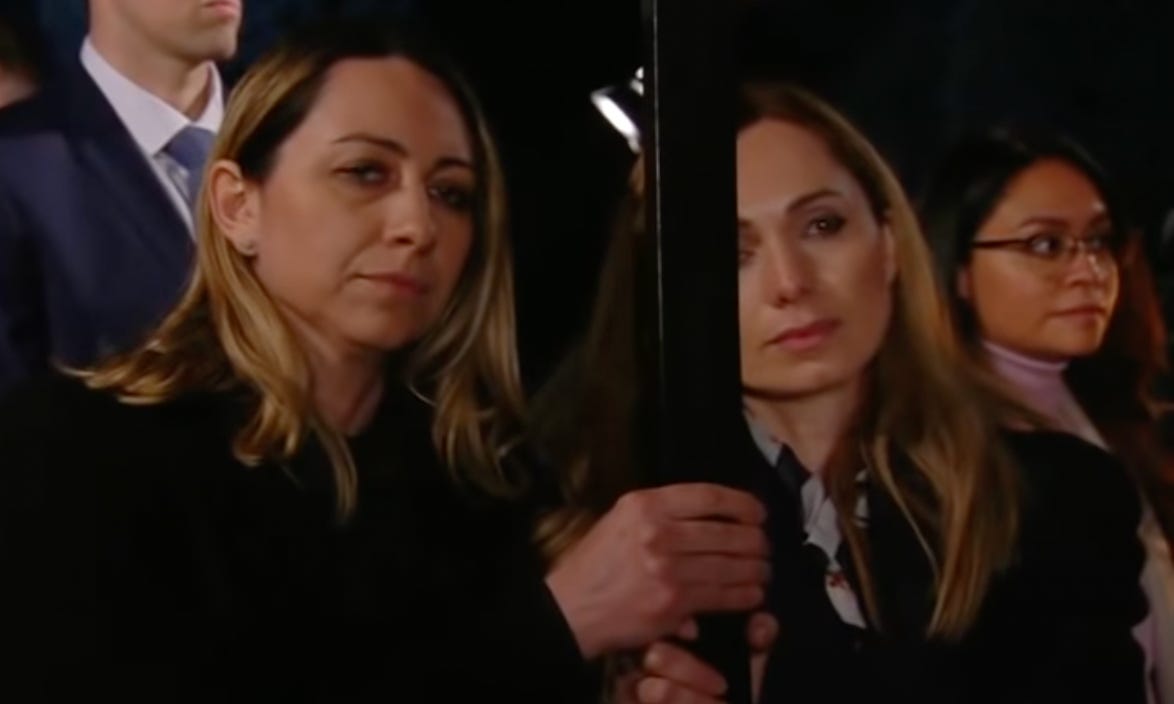
While Francis has dispatched cardinals to support humanitarian efforts in Ukraine, and expressed solidarity with the Ukrainian people, Ukrainian bishops and civic officials have been calling on the pope to speak more forcefully against the Russian invasion of their county.
The pope’s Easter and Triduum preaching mentioned Ukraine several times, urging and praying for peace in the country. But the Pope did not mention Russia by name, a fact noted by Ukrainians. Francis has aimed at maintaining ecumenical relations with the Orthodox Patriarch Kirill of Moscow, and it’s not clear whether that goal has been a factor in his rhetorical choices.
But it is clear, as Ed wrote last week, that as the war drags on, and wartime atrocities become more apparent, ecumenical efforts from Rome toward Moscow may come at a cost among Catholics, especially those who hope to see the pope express firmer support for Ukraine’s national defense.
The German ‘synodal path’ and the world’s bishops
As of Monday, more than 90 bishops have appended their names to an open letter addressed to the bishops of Germany, which expresses concern that the German “synodal path” will:
“undermine the credibility of Church authority,”
“diminish the meaning of Christian freedom,”
and cause Catholics to “distrust the very idea of ‘synodality,’ thus further impeding the Church’s necessary conversation about fulfilling the mission of converting and sanctifying the world.”
The April 11 letter, which originated with a group of U.S. bishops, is mostly signed by Americans, but its signatories also include bishops of Tanzania, Brazil, Papua New Guinea, England, Uruguay, Canada, Nigeria, and Cameroon, among others.
Some names are expected, including American “conservative” bishops who have already spoken out about the German synodal path. Other signers are bishops often regarded as more “moderate,” including retired Archbishop Joseph Kurtz, and Bishop Michael Barber, SJ, of Oakland.
Bishop Georg Bätzing, president of the German bishops’ conference, responded to the letter April 14, insisting that the “synodal path” does not undermine the authority of Pope Francis or the Church, and that it draws from Scripture and Tradition.
Bätzing said the synodal path is about the abuse of power in the Church, and an effort to include “the participation of the faithful in decision-making at all levels of ecclesiastical action.”
The bishop said, essentially, that the German bishops want want to listen to the Holy Spirit, and that includes listening to all the baptized.
It’s true, of course, that listening to the Holy Spirit involves listening to those baptized into the prophetic identity of Christ. But the bishops who signed the letter, it seems to me, are concerned that their German counterparts are going well beyond listening.
What’s stirred all this controversy isn’t the advocacy of lay people for “revising” the Church’s sexual morality, or eschewing certain elements of her doctrinal teaching. It’s ambiguity from German bishops on what their response will be — uncertainty about why some bishops of Germany have expressed support for the liturgical blessings of same-sex couples, or the ordination of women, or an eschewing of the Church’s theology of orders.
That support has left some American bishops, among others, concerned about the prospect of an inevitable clash between what the synodal way is voting to propose, and what the Catholic Church teaches — and whether that clash will lead to a kind of mini-Reformation in Germany, and with it, a formal schism in the Church.
Is that a realistic possibility? It’s hard to say. It is possible that the German synodal way will fizzle out or collapse under its own weight — it’s already struggled to gather a quorum at deliberative sessions. It’s possible it will end in a set of “recommendations” sent to Rome for further study, where they mostly will die on the vine.
As a conference, the German bishops probably won’t officially pass particular legislation or formal doctrinal statements that defy or reject Catholic teaching. Instead, they’ll probably pass statements of practiced ambiguity, designed to avoid both open confrontation with Rome and the appearance of rejecting the ideas of the synodal path. As a body, the bishops will want to walk a tightrope aimed at offending no one.
But the German bishops who’ve lent support to doctrinally problematic ideas aren’t likely to just stop talking about them. So the ideas of the German synod will probably percolate, pervade, and take shape in individual German dioceses, some of which have already okayed liturgical blessings for same-sex couples, despite a Vatican prohibition on them.
That kind of diffused pastoral practice will be more difficult to address by open letter or theological debate. It’s the kind of thing Rome generally addresses with apostolic visitations — official reviews of pastoral practice and diocesan leadership, aimed at ensuring doctrinal and canonical fidelity. Will that actually happen in Germany?
Your guess, my friends, is as good as mine. But we’ll be watching.
‘Like praying in quicksand’
A priest friend on Sunday afternoon told me that by the end of the Chrism Mass, the liturgies of the Triduum, the Easter Vigil, and two Easter Sunday Masses, he was so tired he felt like he was “praying in quicksand.”
It was an apt description, and a reminder to thank the clerics, musicians, and other people who make the Holy Week liturgies happen — the Church’s Super Bowl week, really.
So thank you, very much, priests, deacons, bishops, musicians, extraordinary liturgical ministers, et al.
But my friend’s description also got me wondering about how actual quicksand works. Maybe you’ve wondered that too.
Well, here’s what you need to know about the world’s favorite non-Newtonian fluid:
Thank you
At our house, we spent most of Sunday recovering from the Easter Vigil. It’s the most beautiful Mass of the year, but, let’s face it: Nearly four hours of liturgy, lasting well into the night, leads to some grumpy kids the next morning.
Add an Easter basket full of sugar into the equation, and you get quite a day to contend with.
But it was worth it for us to attend the Easter Vigil, because I know our children’s memories will be formed by the immersive liturgical experiences of the Church’s High Holy Days.
In fact, here’s my daughter during the vigil’s Service of Light, flanked by my mom and dad, and absolutely entranced by the beauty of the moment, and the joy of carrying her own little candle:

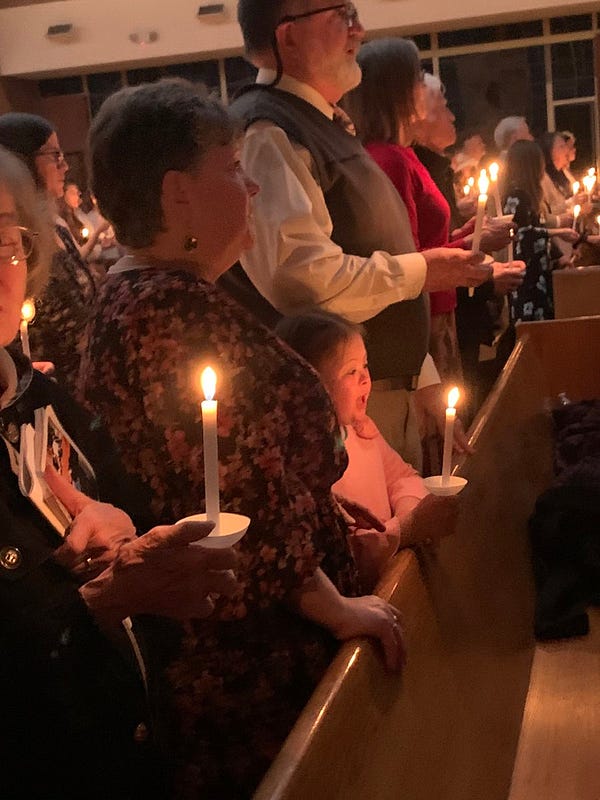
It was also beautiful at our parish to see seven catechumens baptized, and then to seem them receive confirmation and their first Eucharist. Honestly, it was a consolation from the Lord to see those people choose Christ and His Church, and receive new life in the waters of baptism.
Thanks be to God.
It is also a consolation for us here at The Pillar to know that because of you all, we’ll be sending more than $3,500 to the Archeparchy of Philadelphia’s Ukraine Relief Fund.
You might remember that we told you we’d send $1 for every new person on our mailing list to the fund, and $10 for every new paying subscriber who signed up during Lent.
You guys generously responded to that invitation, and we’re deeply grateful.
In fact, we want to do more, so we’re going to keep our pledge active until Divine Mercy Sunday — you can still add to our almsgiving, by adding to our mailing list.
There is absolutely no pressure, because you’ve already done a lot. But I’m guessing that if you share The Pillar, or give a gift subscription, or sign up as a paying subscriber, we can get all the way to $4,000 in assistance for the Church in Ukraine by the Sunday of Divine Mercy.
Finally
Pope emeritus Benedict XVI was elected to the papacy 17 years ago today. And just a few days ago, on Holy Saturday, the former pope turned 95 years old. Pope Francis has said that he’s praying daily for his predecessor and urged Catholics to do the same. I suspect many in the Church are praying that the former pope be blessed with peace, faith, and hope during the twilight years of his life.
Please be assured of our prayers, and please keep praying for us. We need it.
Happy Easter,
JD Flynn
editor-in-chief
The Pillar

